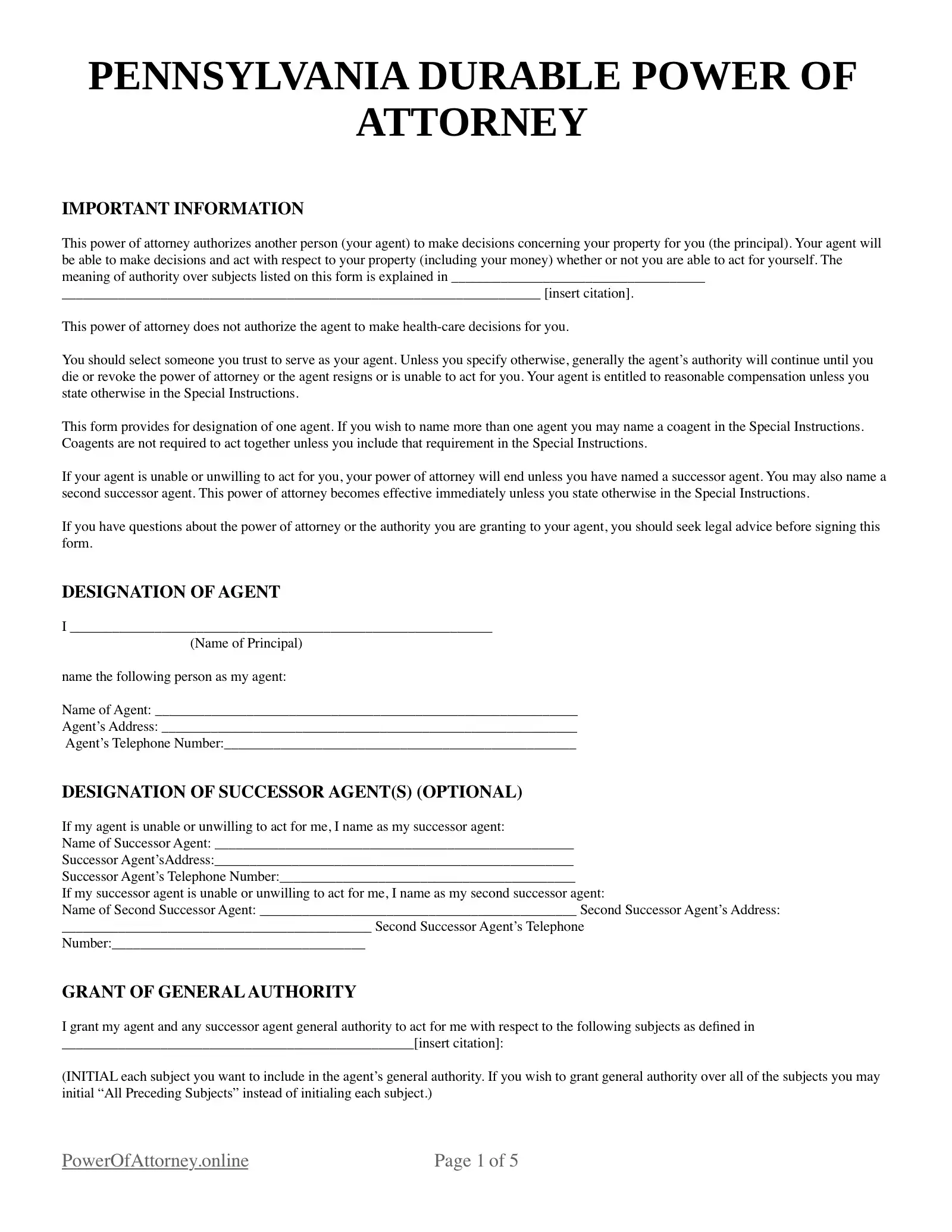Free Pennsylvania Durable Power of Attorney Forms
A power of attorney (POA) form can be created and used in Pennsylvania to designate an individual (an agent) to make financial decisions on behalf of someone else.
The authority granted by a POA may end if the person who assigns authority (the principal) becomes incapacitated.
In the event of the principal’s incapacitation,** the agent may remain with their authority** if the principal creates a durable power of attorney.

Pennsylvania Durable Power of Attorney Laws
Each state creates acts and regulations to determine how a durable power of attorney can be created and put into effect.
Title 20, chapter 56 of the Pennsylvania General Assembly lists all requirements to create a legally valid power of attorney.
- Pennsylvania durable power of attorney creation and effect: The PA general assembly states (§ 5604) “The authority conferred shall be exercisable notwithstanding the principal's subsequent disability or incapacity”. Meaning, a principal may state an agent may be given and keep power even if the principal is disabled.
Signing Requirements in Pennsylvania
Along with laws that determine the limitations and permissions of a power of attorney, each state determines the signing requirements of durable and healthcare power of attorney forms.
For a durable power of attorney to be considered legally valid and put into effect, the document must be signed by both the agent and principal.
The durable POA may also be signed in the principal’s place by someone over the age of 18 at the direction of the principal.
It must also be signed in the presence of **two witnesses and a notary public **(§ 5601b).
For someone to be an eligible witness, they must be 18 or over and not the agent or notary included on the form.
How to Write a Durable POA in Pennsylvania
For your durable power of attorney to remain in effect even if you become mentally incompetent or disabled, it’s essential to draft your document with all the correct details included.
The following steps will help you create your durable POA in Pennsylvania.
Download a Durable Power of Attorney Template
By downloading a printable template of a durable power of attorney, you can draft your own document easily and avoid mistakes.
Using a template also allows you to avoid having to ask a lawyer to draw up your document. Lawyer fees can easily cost you hundreds of dollars, and by using a template you can skip those excessive fees.
Include an Agent and Alternate Agent
An agent should be someone you completely trust to make important financial decisions.
An agent is usually a:
- Spouse
- Trustworthy friend
- Immediate relative
It is also a good idea to list an alternate agent in case your primary agent doesn’t or can’t perform their duties.
The** full name and contact information** of each agent included in your durable POA form must be presented in the legal document.
Add What Your Agent’s Limitations Are
Perhaps you do not wish for your agent to be able to make every financial choice on your behalf.
Within your durable power of attorney, you can cite the exact type of financial decisions your agent will be allowed to make.
Include all the Necessary Signatures
At the end of your document, you and the agent must both sign the durable power of attorney form. It’s also necessary to include the date that you are both signing the POA form.
To comply with Pennsylvania signing requirements, you must include the signatures and printed names of two eligible witnesses.
Along with the witness signatures, an acknowledgment from a notary public also needs to be added to your document.